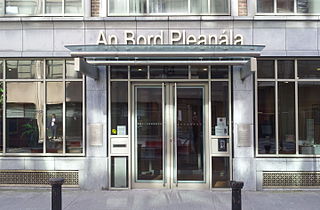Related Research Articles
The Northern Ireland Policing Board is the police authority for Northern Ireland, charged with supervising the activities of the Police Service of Northern Ireland (PSNI). It is a non-departmental public body composed of members of the Northern Ireland Assembly and independent citizens who are appointed by the Minister of Justice using the Nolan principles for public appointments.
Ervia, previously known as Bord Gáis or Bord Gáis Éireann, is a multi-utility company distributing pipeline natural gas and dark fibre services in Ireland. The state-owned company has built an extensive network across Ireland.

Bòrd na Gàidhlig is the executive non-departmental public body of the Scottish Government with responsibility for Gaelic. It was established by an Act of the Scottish Parliament in 2005 and is based in Inverness.

Foras na Gaeilge is a public body responsible for the promotion of the Irish language throughout the island of Ireland, including both the Republic of Ireland and Northern Ireland. It was set up on 2 December 1999, assuming the roles of the Irish language board Bord na Gaeilge, the publisher An Gúm, and the terminological committee An Coiste Téarmaíochta, all three of which had formerly been state bodies of the Irish government.

According to the Constitution of Ireland, the names of the Irish state are Ireland (English) and Éire (Irish). From 1922 to 1937, its legal names were the Irish Free State (English) and Saorstát Éireann (Irish). The state has jurisdiction over almost five-sixths of the island of Ireland. The rest of the island is Northern Ireland, a part of the United Kingdom. In 1948 Ireland adopted the terms Republic of Ireland (English) and Poblacht na hÉireann (Irish) as the official descriptions of the state, without changing the constitutional names.

An Bord Pleanála is an independent, statutory, quasi-judicial body that decides on appeals from planning decisions made by local authorities in the Republic of Ireland. As of 2007, An Bord Pleanála directly decided major strategic infrastructural projects under the provisions of the Planning and Development Act 2006. The Board also hears applications from local authorities for projects which would have a significant environmental impact.
A Publicly-owned company is the name given in Ireland to a state-owned enterprise, that is to say, a commercial business which is beneficially owned, either completely or majority, by the Irish Government. Each state-sponsored body has a sponsor Minister who acts as shareholder, either independently, or in conjunction with the Minister for Finance, who may also be a shareholder. State-sponsored bodies are often popularly called semi-state companies, a misnomer, since they are all (mostly) fully owned by the state, in addition not all of them are actually companies.

The Financial Reporting Council (FRC) is an independent regulator in the UK and Ireland based in London Wall in the City of London, responsible for regulating auditors, accountants and actuaries, and setting the UK's Corporate Governance and Stewardship Codes. The FRC seeks to promote transparency and integrity in business by aiming its work at investors and others who rely on company reports, audits and high-quality risk management.

Tourism Northern Ireland, also known as Tourism NI, is a non-departmental public body of the Department for the Economy. Its primary objective is to promote Northern Ireland as a tourist destination to domestic tourists, from within Northern Ireland, and to visitors from the Republic of Ireland.

Fáinne is the name of a pin badge worn to show fluency in, or a willingness to speak, the Irish language.

Greyhound Racing Ireland is an Irish semi-state body charged with regulating and promoting Greyhound racing in Ireland. The organisation has been active in developing the sport in Ireland since its founding on 11 July 1958.
The Special Group on Public Service Numbers and Expenditure Programmes was an advisory committee established by the Irish government in 2008 to recommend cuts in public spending. It was chaired by economist Colm McCarthy. It published two volumes of findings, commonly known as the McCarthy report, on 16 July 2009.

The Music Show was an annual event which took place in the RDS, Dublin on the first weekend of October each year. The event combined live performances, music workshops and talks given by professionals within the music industry. It had several high-profile sponsors, including Hot Press, RTÉ 2fm, the Irish Independent and the Sunday Independent. RTÉ 2fm provided live radio coverage of the event.
The Turf Club was the regulatory body for horse racing in Ireland until 31 December 2017.
A naíonra is an Irish medium playgroup for pre-school children, which follows the principle of Total Early Immersion.
Snip Nua was a racing greyhound who featured in the BBC television show Three Men go to Ireland.
The Comptroller and Auditor General (C&AG) is the constitutional officer responsible for public audit in Ireland. The Office of the Comptroller and Auditor General is the public audit body for the Republic of Ireland and is headed by the C&AG.

As of 2023 an as-yet unnamed children's hospital is under construction on the campus of St. James's Hospital in Dublin, Ireland, as a regional secondary and national tertiary centre. Referred to in planning documents simply as the new children's hospital, it is due to combine the services currently provided at Dublin's three tertiary children's hospitals: Children's Health Ireland at Crumlin ; Children's Health Ireland at Temple Street ; and Children's Health Ireland at Tallaght.
Colm McCarthy B Comm MA MEcon, is an Irish economist who lectures in the School of Economics in University College Dublin, known for chairing The Special Group on Public Service Numbers and Expenditure Programmes and producing a report to the Irish Government to deal with the Financial crisis in 2009. Similar to the 2009 McCarthy Report, Colm also participated in the 1987 An Bord Snip. A writer on Economics and public finances, McCarthy is regular contributor in the Irish Media discussing economics, and he works as a columnist for the Irish Independent.
References
- ↑ Moloney, Senan (3 December 2008). "'An Bord Snip' rolled out to tackle Exchequer shortfall". Irish Independent . Retrieved 6 February 2009.
- ↑ Ine Kerr (27 November 2008). "'An Bord Snip Nua' told to wield the axe". Irish Independent . Retrieved 6 February 2009.